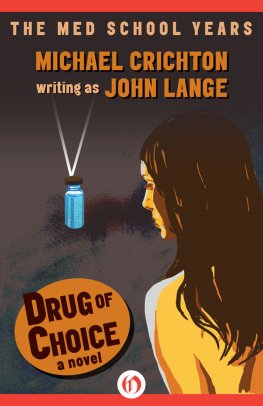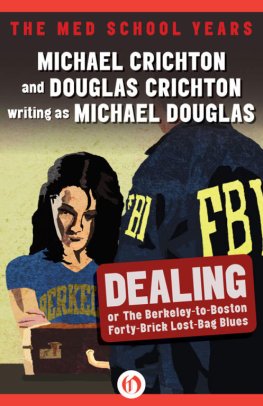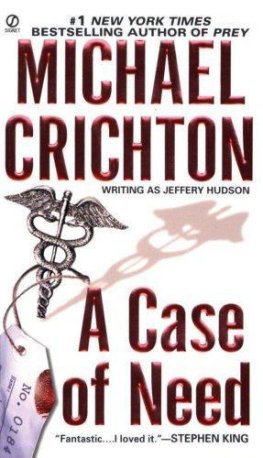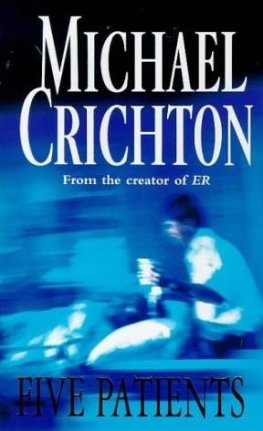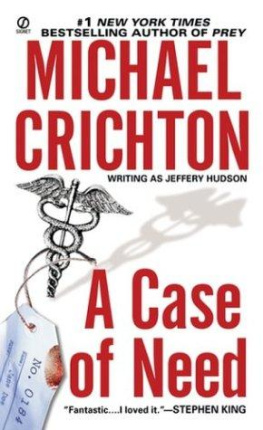Michael Crichton writing as John Lange
DRUG OF CHOICE
A Novel
ALL EVENTS, CHARACTERS AND ORGANIZATIONS IN THIS STORY ARE FICTITIOUS AND ARE NOT BASED UPON ANY REAL EVENTS, CHARACTERS OR ORGANIZATIONS.
The beginning of modern science is also the beginning of calamity.
KARL JASPERS
Give me librium or give me meth!
ANON
Shall I tell you what knowledge is? It is to know both what one knows and what one does not know.
Saying of Confucius
THE COP, POSITIONED AT the intersection of the Santa Ana Freeway and U.S. 85, saw it all. At three in the afternoon an Angel went past him, hunched over his bike, doing a hundred and ten. The cop later remembered that the Angel had a maniacal grin on his face as he raced forward, weaving among the passenger cars.
The policeman gave chase, light flashing and siren wailing, but traffic was heavy and the Angel managed to keep his distance. He left the freeway in the foothills, and headed north into the mountains, still going more than a hundred miles an hour. The cop followed, but the bike was taking chances, and managed to pull further ahead.
After twenty minutes, the police car came around a bend and the cop saw the bike at the side of the road, lying on its side. The motor was still on, spinning the rear wheel.
The Angel lay sprawled on the ground a short distance away. He had apparently been moving slowly at the time of the accident, because he was unmarkedno cuts, no bruises, no scrapes. He was, however, comatose, and could not be roused. The policeman checked the pulse, which was strong and regular. He tried for several minutes to awaken the Angel, and then returned to his car to call an ambulance.
Roger Clark, resident in internal medicine, went on duty at the Los Angeles Memorial Hospital at six. When he arrived on the floor, he went to see Baker, the day resident. Baker was in the dressing room, changing from his whites to street clothes. He looked tired.
Howre things? Clark said, stripping off his sportcoat and putting on a white jacket.
Okay. Not much excitement, except for Mrs. Leaver. She still pulls out her intravenous lines when she thinks nobodys looking.
Clark nodded, stepping to the mirror and straightening his tie.
And then Henry, Baker said. He had the DTs this morning, and sat in the corner arguing with the little green men.
How is he now?
We gave him some librium, but watch him. One of the nurses said he felt her up last night.
Whos that?
Alice.
Alice? He must really be hallucinating if he felt her up.
Well, just dont mention it to Alice. Shes very sensitive.
Baker finished dressing, lit a cigarette, and rapidly went through the status of the other patients. Nothing much had changed since Clark had gone off duty twenty-four hours before.
Oh, Baker said. Almost forgot a new admission. One of those Hells Angels. The cops brought him in after he had a motorcycle accident. He was comatose and he hasnt come out yet.
You ask for a neurological consult?
Yeah, but they probably wont get around to it until morning.
Whats his status now?
We did the usual stuff. Skull films negative, CSF normal, chest films okay, EEG vaguely abnormal, but nothing specific. All his reflexes are there.
Cardiorespiratory depression?
Nope. Hes just fine. To look at him, youd think he was asleep.
You treating?
No, were waiting for the consult. Let the neuro boys play around with him for a while.
Okay. Anything else?
No. Thats it. Baker smiled. See you tomorrow.
When he was alone, Clark made a quick round of the wards, checking on the patients. Everyone seemed in pretty good shape. When he came to the comatose Angel, he paused.
The patient was young, in his early twenties. Nobody had washed him since admission; his hair was greasy, his face was unshaven and streaked with grit, and his fingernails were rimmed with black. He lay quietly in bed, not moving, breathing slowly and easily. Clark checked him over, listening to the heart, tapping out the reflexes. He could find nothing wrong. They had put an intravenous line into him, and had catheterized him in case of urinary retention. The catheter tube led to a bottle on the floor. He looked at it.
The urine was bright blue.
Frowning, he held the bottle up to the light and looked closely. It was an odd, vivid blue, almost fluorescent.
What turned urine blue?
He went back to the desk, hoping to catch Baker and ask about the urine, but Baker was gone. Sandra, the night nurse, was there.
Were you on duty when they brought that Angel in?
Arthur Lewis? Yes.
What happened?
Sandra shrugged. The police brought him into the emergency ward. They figured hed had an accident, so they took him up to X-ray and checked him over. No broken bones, nothing. All the enzymes and electrolytes came back normal. The EW couldnt figure it out, so they shipped him up here. Its all very mysterious. He was going a hundred before the accident, but the police think he slowed way down before it happened. The policeman who found him said it was just as if he had suddenly fallen asleep.
Ummm, Clark said. He bit his lip. What about his urine?
What about it?
Has it always been blue?
Sandra frowned and left the desk. She went into the ward and looked at the bottle, then returned. Ive never seen anything like that, she said.
Neither have I.
What turns urine blue?
I was just wondering the same thing, Clark said. Why dont you call down to neurology and say the guy is still in a coma, but urinating blue. Maybe thatll bring them up.
Ten minutes later, Harley Spence, Chief of Neurology, appeared on the seventh floor, panting slightly. He was a white-haired man in his middle fifties, very proper in a three-piece suit.
His first words to Clark were: Urinating blue?
Thats right, sir.
How long has this been going on?
Apparently it just started, within the last few minutes.
Fascinating, Spence said. Perhaps a new kind of porphyria. Or some idiosyncratic drug reaction. Whatever it is, its definitely reportable.
Clark nodded. In his mind, he saw the journal article: H.A. Spence: Unusual Urinary Pigment in a Comatose Man. Report of a Case.
They walked to the patients bed. Clark ran through the story while Spence began his examination. Arthur Lewis, twenty-four, unemployed, first admission through the EW in a coma after a motorcycle accident
Motorcycle accident? Spence said.
Apparently.
Hes unmarked. Not a scratch on him. Would you say thats likely?
No sir, but thats the police story.
Ummm.
Muttering to himself, Spence conducted his neurological examination. He worked briskly at first, and then more slowly. Finally he scratched his head.
Remarkable, he said. Quite remarkable. And this urinebright blue.
Spence stared at the bottle, hesitated, then turned to Clark. What makes urine blue?
Clark shrugged.
Spence shook his head, put the bottle down. He stepped back from the patient and looked at him.
Jesus Christ, blue piss, he said. What a patient.
And he walked off.
The metabolic boys came around an hour later; they collected several samples for analysis, amid a lot of vague talk about tubular secretory rates and refractile indices; Clark listened to them until he was sure they had no idea what was going on. Then, as he was leaving, one of them said, Listen, Rog, what do you make of this?
I dont make anything of it, Clark said.
Do you think its a drug thing? Youre the local expert.
Clark smiled. Hardly. He had done two years of drug testing at Bethesda, but it had been boring work, measuring excretion and metabolism of experimental drugs in animals and, occasionally, in human subjects. He had only done it because it got him out of the army.

